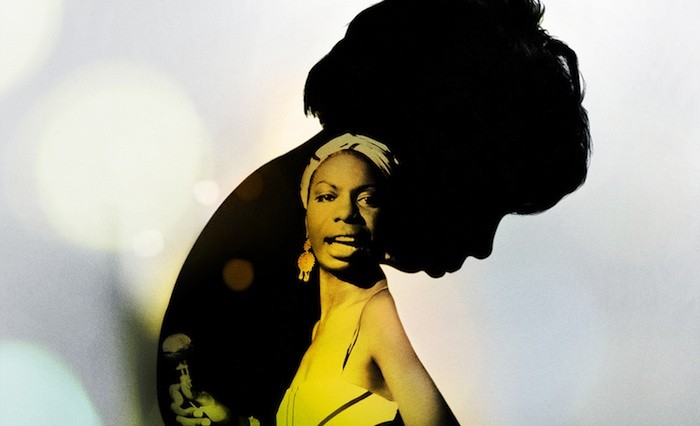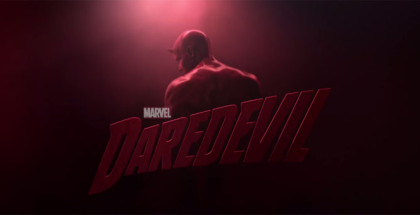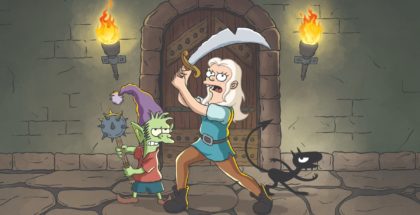Interview: Jayson Jackson, producer of Netflix documentary What Happened, Miss Simone?
Matthew Turner | On 23, Jun 2015
On Friday 26th June, What Happened, Miss Simone? is released on Netflix around the world. The documentary about Nina Simone reveals a new side to the iconic singer, marking not only a significant point in the presentation of her life on screen, but also a milestone in the streaming service’s original productions.
We sat down with Jayson Jackson, producer of the film, to talk about how the film was made and what makes it so special.
How did the project come about, first of all?
Let’s see, maybe four years ago, maybe three and a half years ago, a friend introduced me to Lisa Simone, to Nina’s daughter, with the idea of producing a stage play on Nina’s life, because Lisa wanted to do a play about her mum and I’d produced some theatre before and our mutual friend thought I would be a good fit. I met Lisa and her husband Rob and we started talking about it and quickly sort of fell in like with each other and as I started doing more and more research on Nina, I realised she had lived a pretty extraordinary life. I really realised I knew nothing about her, though we all think we do know so much about Nina. I felt like a documentary would be a better place to start with her life – it would give us the room to actually tell a more intimate story about her. And luckily Lisa agreed and we moved forward with that.
Exactly how much of Nina’s story were you aware of beforehand?
Well, as a person of colour from America, I had romanticised the civil rights aspect of her career. And I knew a little bit about her coming up in the West Village scene as a singer and piano player, but I had no idea about her classical training and certainly had no idea about how deep in the civil rights and Black nationalist movement she had been.
You mentioned the research earlier – what kind of research did you do?
Well, there’s a nice dearth of biographies out there on her. There’s one autobiography that Stephen Cleary did (I Put A Spell On You) and a couple of others. Princess Noire, which was written by a French woman, Nadine Cohodas, and a second unauthorised bio done on Nina and when you start asking around – I worked in the music business for a long time, so I know a good deal of people – when you start asking people about Nina Simone, you’d be surprised: most people have a story about her. [Laughs] She lived a very loud life, an amazing one, and everyone has had some encounter with Nina at one point or another.
Was there a piece of footage or audio that crystallised the film for you, where you felt, “OK, now we’ve got a movie”?
I’ll tell you, what happened was our director, Liz Garbus, who did an amazing, amazing job with the film – as producers, we were like, ‘Okay, what’s our script going to be, what’s the storyline going to be?’, and Liz, geniusly, said: “You know what? Let’s not even worry about putting anything together in terms of a script or story line. Let’s just search for footage around the world and whatever we get back, let’s look at it and let that tell a story.” And I’ll never forget the moment when one of our other producers, Amy Hobby – who sort of led the research team – had reached out to Stephen Cleary, Nina’s autobiographer for that book I Put A Spell On You, to see if maybe he had some notes that we could use in the film. And Stephen is an older British man who lives in the French Pyrenees mountains. He said: “You know, I vaguely remember audio recording my interviews with Nina.” We were like: “Are you serious? Do you have those tapes?” He’s like: “I don’t know – they’ve been in my basement for years, they might still be there.” And Amy got on a plane and went out there and she found the tapes and it was 30 to 40 hours of audio footage of Nina telling her life story and that’s the moment when we were like: “Wow, we not only have a film, we have a special film.”
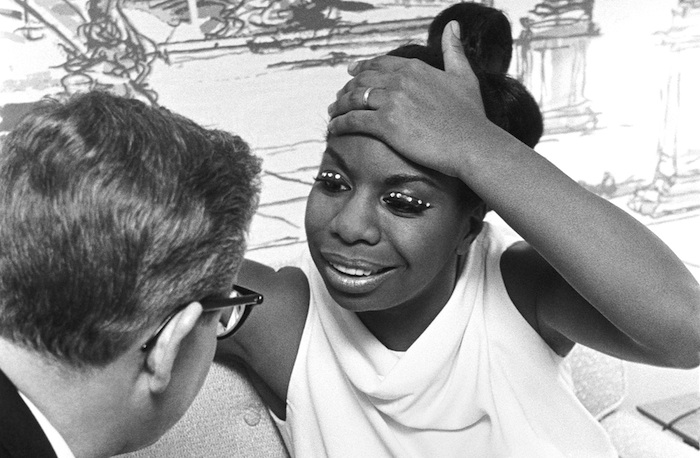
Photo credit: Al Wertheimer
Some of her interviews are absolutely extraordinary. Where does the piece where she’s talking about the lightning in Africa come from?
That comes from the footage from her autobiography. She felt strongly about her time in Africa and, obviously, between what she said and what you heard in the film, and also what Lisa and other people who knew her well, that might have been the freest and happiest time of her life.
The film touches on some powerfully emotive issues, such as domestic abuse and mental illness. How important was it to you to tell that side of Nina’s story?
Well, what we all decided in the beginning, and really the way Liz lead the whole production, was we wanted to tell an honest story and we wanted Nina to tell it. We weren’t ever interested in doing a huge talking head piece where everyone gives their version of who Nina Simone was or what she stood for. We wanted it to be something that came first person, from her, and we knew we had the ability to do something in that direction, because Nina was a meticulous note-taker. She took notes on everything – she wrote on the back of napkins and she wrote on hotel scratchpads and kept everything, so her daughter had a fair amount of written stuff, including those amazing diaries, so we knew we had something of a story just from what she wrote and then, obviously, we had to find the audio to go with it. But once we got a hold of that audio, we knew we wanted to tell a really intimate portrayal of her life, but let her be the lead voice on it.
How did Liz come to be involved?
So, I had been working with Nina’s daughter Lisa Simone, who was not only her daughter but the administrator of the estate at that point in time, so we made our relationship sort of formal and I started speaking with different production companies and realised I knew a few people at Radical Media and I hold them in the highest standard of filmmaking – they’ve done some great stuff in the past between The Fog of War and the Paul Simon documentary, Under African Skies, and felt really fortunate to have them get involved and really be excited about being involved. Not just excited about the potential for some sort of commercial success, but really excited about the ability to tell Nina’s story. And we put together a list of maybe 50 directors and there were three at the top of the list and Liz was at the top. And she was actually available and free and extremely excited about being involved. So, in terms of documentaries, this really came together in a year and a half and actually got done in a year. I can’t say enough good things about Liz Garbus and Amy Hobby and the way they went about getting this done – it’s really been extraordinary.
We think Liz was an excellent choice for the film – we really liked Love, Marilyn a couple of years ago.
I’m so glad you say that, because what really made me keen on her being involved in this was a film that she did in 1999 called The Farm: Angola, where she basically just went to this huge industrial prison complex [in Louisiana] and sort of told a story ahead of its time that’s almost like indentured servitude and humanised these inmates and as a young man, I was completely struck by that. And I had no idea that I’d be involved in a film about Nina Simone some 15, 16 years later, but when that did happen, Liz was at the top of my list.
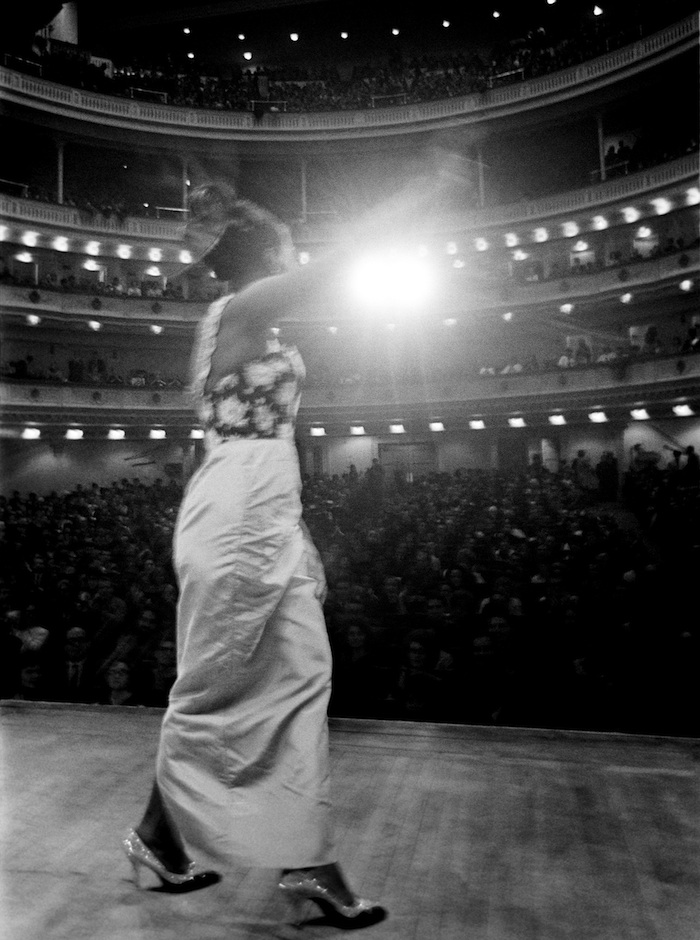
Photo credit: Al Wertheimer
Did you cut anything out of the film that you were sorry to see go?
[Laughs] No! Honestly, no – the first cut of this film is very similar to what’s actually out there now and really, it only got better, to be quite honest. We did a couple of small focus screenings for film-makers and people in the industry and they asked some great questions and gave some great comments and we really thinned it down to the essence of what the story is and that’s what people will be seeing.
What was the biggest surprise for you during the making of the film?
Honestly, the domestic violence and the degree to which it went on. It wasn’t just one incident and it went on for years. I never would have thought a civil rights muse, in her own mind, would have tolerated that sort of abuse. But she did, and apparently, it was common for that day and age. And also the fact that in her diary, she writes about almost liking it, which, you know, I mean we’re all flawed human beings in one way or another, but I just never thought I’d hear Nina Simone say those words.
This is a bit of an unfortunate segue from that question, but do you have a favourite scene in the film?
[Laughs] I have a lot of favourite scenes. The scene that really reduces me to tears each and every time is hearing her sing The King of Love, about the death of Martin Luther King. It’s hard to keep it together during that. But my favourite scene is Dick Gregory, when Dick Gregory says, ‘Of all the suffering that black folks have done in America, to hear a woman get up and say, ‘Mississippi, Goddamn’ when we all felt that way, but no man would ever dare say it, to hear woman get up and say it, how that must have made people feel…’ – for me, that’s the triumphant moment of spirit over conditions, you know what I mean?
Was there anyone you wanted but were unable to get for the movie?
No. There’s a few people who actually didn’t want to be in it, who refused. George Wein refused us in the beginning, as did Al Shankman, and these were two people who obviously knew Nina for a long, long time and loved her dearly and were really suspicious of the production. There had been many attempts to make a Nina Simone documentary but no definitive one had ever been done, because there’s so much contention and litigation surrounding the estate. So this kind of came together in a magical way and without Liz’s tenacity, I don’t know that we would’ve been able to get the people that we did.
How important is VOD to the future of documentary filmmaking?
Coming from the States, hugely important. Myself included and most people in my network, that’s where we see most of our documentaries, because it’s on Netflix and Video On Demand and the fact that this is Netflix’ first original documentary. When they told us that in the beginning, I was like: “What do you mean? You guys have been putting out documentary since [forever] – I watch all my documentaries on Netflix.” And they were like, “Yeah, but those were all acquisitions, this is the first time we’ve been involved in a production from the beginning to the end.” And I was like, “Wow, that’s a pretty distinct honour.” I mean the fact that it’s Nina Simone and that speaks to their commitment to storytelling and it certainly speaks to Nina’s importance in pop culture.
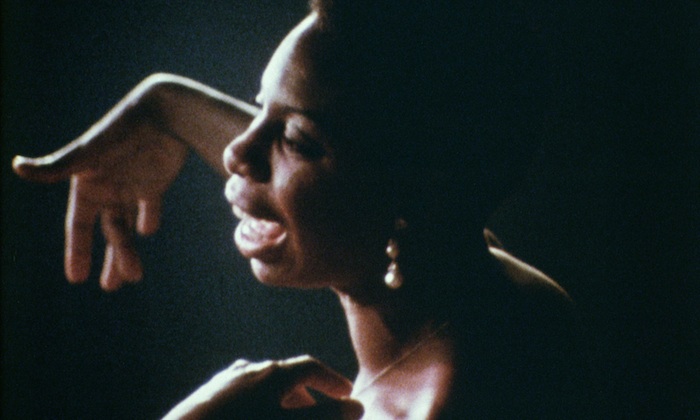
Photo courtesy of Peter Rodis/Netflix
Is there a possibility of an actual Nina Simone biopic, and would you be involved, if there were?
There has definitely been talk of a biopic, and obviously, you know one was made already, to not such a warm reception. There has been talk of it, but I think people are waiting to see how the general public respond to this story and the way it’s told. But there’s definitely been talk of it and yes, I think the team that’s involved in this would be involved in the narrative.
I don’t believe the previous biopic touched on the mental illness or the domestic violence – is that correct?
You are absolutely correct and they also didn’t have the estate approval, they didn’t have the estate on board, or Nina’s daughter.
So actually, there would be a huge benefit to doing a new one…
Yes, I think so.
One final question – did you get a sense of how Lisa’s feelings had changed towards her mother over the years? And also her feelings during the making of the documentary?
That’s a great question and a not commonly asked one. This process, for Lisa, has been cathartic. As you can imagine, her relationship to her mother is a little abnormal. Her mother was a superstar, but also a hugely important cultural figure and also deeply disturbed. So Lisa didn’t spend a whole lot of time around her mother growing up and she actually left the house when she was 17 and went to the military. So she had a quite contentious relationship with her mother and I think honouring her in this way of telling her true story, not the story people might want to hear or the story one faction of the Nina camp might want to hear, telling the story for what it is, I think this has been really therapeutic and cathartic for her. What she’s said in the past is that she can let it go now, all her emotions about her mum, she can let it go, because an accurate, true story has been told about her and her work is done.
What Happened, Nina Simone? is released exclusively on Netflix on Friday 26th June. We’ll have a review of the film for you before then.


